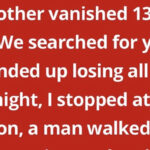I’ve always been the one in the background. In my family, I wasn’t the favorite, or even close. I was the quiet one, the one who didn’t “live up to potential,” the one who always made the safe, careful choices—and yet still seemed to fall short. Divorced, no kids, and in my parents’ eyes, never quite enough. Meanwhile, my younger brother Peter could do no wrong. The golden child. The successful one. And his son, Nick?
Spoiled to the core, constantly shielded from consequences, a product of years of indulgence and excuses.I spent years shrinking myself to fit into the narrow space my family allowed me. Every visit home was a reminder of who I wasn’t. No matter what I achieved, it paled in comparison to Peter’s career, Peter’s family, Peter’s picture-perfect life. And yet, I kept trying. Hoping one day they’d see me—not as a failure, but as someone who mattered.
For my 40th birthday, I decided to stop waiting for someone else to celebrate me. I bought myself a brand-new blue SUV—a bold color, something I’d always wanted but never dared—and hosted a small party at my place. I hoped maybe this time, things would be different. Maybe my family would come, see how far I’d come, and recognize me for who I really was. Independent. Capable. Whole.
They came, alright. But things didn’t unfold the way I imagined. While I was upstairs in the attic, dragging down extra chairs for everyone, Nick—sixteen, smug, and completely unaccountable—decided to take my SUV for a joyride. He didn’t ask. Didn’t even think to. And, predictably, it ended in disaster. He crashed it straight into the neighbor’s brick mailbox, denting the front bumper and scratching up the paint I had so proudly picked out.
